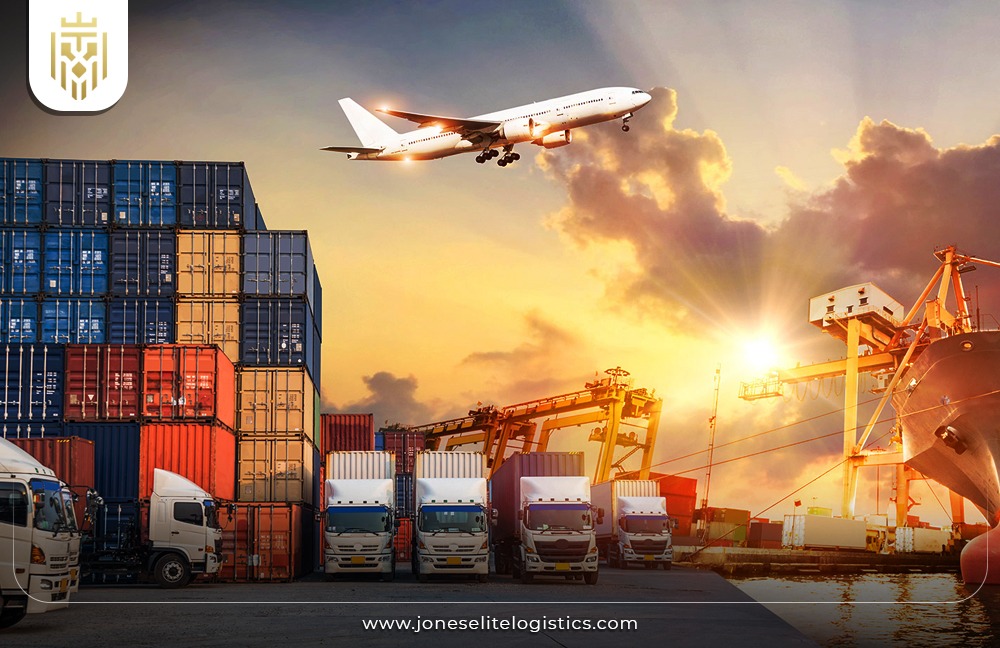Freight forwarding is the overall process that involves the systematic arrangement and shipment of goods from place to place on behalf of a customer/shipper. It manages the entire logistics process, including transportation, documentation, and customs clearance.

Understanding the Role of Freight Forwarding:
The core responsibility of freight forwarding is establishing an arrangement with companies, importers, and exporters that ensures the movement of goods is smoothly carried out to its final destination. Tasks such as negotiating freight rates, arranging storage, and managing documentation are handled by the freight forwarding overseer, who may be associated with DHL Global Forwarding or other international freight forwarders.
The Basics of Freight Forwarding:
We have covered the basic definition and role of freight forwarding. Now, we shall have a sneak-peak behind the scenes of freight forwarding:
Behind the Scenes: How Freight Forwarding Works:
Freight forwarders do not carry out the shipment themselves, but instead offer different transport modes such as as sea freight, air freight, rail, and road freight. They cooperate and coordinate with freight carriers, warehouses, cargo space providers, and customs authorities to handle paperwork, track shipments, and ensure timely delivery while optimizing routes and costs. This collaboration is part of global forwarding in the broader logistics efforts, often facilitated by a freight forwarders association.
Exploring the Stakeholders in Freight Forwarding:
The stakeholders, consisting of shippers, receivers/residents, freight forwarders, customs agents, and regulatory authorities, are influential and play a key role in the planning, execution, and evaluation of logistics activities. A majority of freight forwarding association facilitates networking among these stakeholders.

Why Freight Forwarding Matters in Logistics:
As the intermediary between shippers and carriers, freight forwarding ensures the safe and efficient transportation of goods from location to location. It introduces businesses to new markets, reduces shipping costs for shippers, and ensures on-time delivery.
How Freight Forwarding Facilitates Global Shipping:
International freight forwarders possess the right resources and manpower to streamline the shipment process and navigate through complex international regulations, tariffs, and customs procedures related to international trade to ensure the exchange of goods is done smoothly. Global forwarding optimizes shipping routes, consolidates cargo, and ensures compliance with import/export laws. Ocean freight forwarders play a crucial role in this process, supported by insights from the freight forwarders association.
Streamlining Supply Chains with Freight Forwarding:
An advantage of streamlining supply chains is the movement of goods can be easily tracked and it can be coordinated from manufacturers till it reaches the destined customer. It minimizes delay, reduces inventory cost, and improves overall efficiency through well-planned inland transportation and other logistical solutions.

Services Offered by Freight Forwarders:
Freight forwarders offer a variety of supply chain management services, including sea freight, air freight, rail, and road freight, along with transportation, storage, documentation, cargo insurance, and freight consolidation. They also provide expert advice on logistics expenses incurred during exports.
Moving Goods from Point A to Point B:
The logistics of goods transportation from the origin point to the final destination is handled and overseen by freight forwarders. They must ensure no damage or delay impacts the goods during shipment.
Navigating Customs-Related Regulatory Hurdles:
Customer compliance is essential to follow, as it involves adhering to the trade regulations of countries to which the goods are being either imported or exported. Properly managing customs brokerage services ensures smooth import customs clearance.
Documentation Handling: Ensuring Accuracy and Compliance:
Documentation of freight activities is critical to maintaining accuracy. Bills of lading, commercial invoices, and other shipping documents are managed carefully to meet regulatory requirements. This meticulous documentation process helps avoid international shipment delays and ensures customs compliance.
Benefits of Freight Forwarding in Logistics:
Businesses involved in international shipping benefit from freight forwarding services by saving costs, reducing delays, and ensuring smooth shipping of goods. Engaging the best freight forwarders also allows businesses to focus on core operations while experts handle logistics.
Cost Savings: Maximising Efficiency in Shipping Operations:
Freight forwarders streamline the logistics procedures which improves efficiency. In addition, optimizing shipping routes, cargo consolidation, and negotiations for favorable freight rates are done by the best freight forwarders to help businesses save on logistics costs. Their knowledge of freight charges and shipping methods results in cost-effective freight transportation.
Time Management: Speeding Up Delivery Times with Expertise:
Freight forwarders leverage their expertise and network connections by optimizing shipping routes with the consideration of distance and traffic, mode of transportation, including inland transportation, and freight charges, contributing to efficient delivery. Efficient freight forwarding reduces lead times and enhances customer satisfaction.
Risk Reduction: Mitigating Challenges and Delays in Shipping:
Freight forwarders ensure goods’ safety through regulatory compliance and efficient customs clearance while paying the right customs brokerage, reducing the risk of shipping disruptions. They also provide cargo space and cargo insurance to cover potential losses during transit.

Choosing the Right Freight Forwarder:
The ideal freight forwarder only contributes towards efficient logistics operations and ensures successful international trades are in place consistently. As a partner, they get to know the shipper’s requirements and support them in planning their shipping needs for the long term to ensure good value for money.
Factors to Consider: What to Look for in a Freight Forwarding Partner:
The main criteria should ensure the freight forwarder chosen can handle the goods to be exported/imported and holds expertise in the specific industry the shipper operates. In addition, the ideal freight forwarding company should have reliability, a global network, technological capabilities, and excellent customer service, often supported by freight brokers who facilitate communication and transactions.
Finding the Perfect Fit: Assessing Your Needs and Requirements:
Clients should assess specific shipping needs, including the carriers’ mode preferences, volume, and the level of freight forwarding service required. Clear communication helps align the freight forwarding company and freight brokers with business expectations.
Challenges and Considerations in Freight Forwarding:
Freight Forwarding also has to deal with its set of challenges involving regulatory complexities, geopolitical risks, and environmental sustainability concerns. Additionally, managing fluctuating freight charges and maintaining seamless communication across freight forwarding companies is essential.
Weathering the Storm: Overcoming Obstacles in Global Shipping:
Establishing the ideal shipping route is another mandatory task with difficulties such as unpredictable weather conditions, natural disasters, and geopolitical tensions. A reliable freight forwarding company anticipates potential disruptions and maintains alternative plans.
Sustainability Matters: Balancing Economic Efficiency with Environmental Impact:
Freight forwarders are minimizing environmental impacts by reducing carbon emissions and using eco-friendly shipping practices. Embracing green logistics practices, such as reducing carbon emissions, improving waste management measures, and promoting eco-friendly transportation solutions shows a commitment to sustainable freight transportation.

Future Trends in Freight Forwarding:
India’s freight forwarding industry is estimated at USD 317.62 billion in 2024, projected to reach USD 484.49 billion by 2029. This growth shows increasing contributions from freight forwarding companies bringing in advancements like automation, digitization, and new technologies.
Digital Transformation: The Role of Technology in Shaping the Future of Freight Forwarding:
Technology has become the connector of worlds, and freight forwarding requires connecting with people. Technology is implemented with AI, blockchain, and IoT revolutionizing the entire freight forwarding process by enhancing transparency, efficiency, and collaboration across the supply chain.
Sustainability Initiatives: Green Logistics and Eco-Friendly Practices:
Environmental footprint is a highlight that is being focused upon by freight forwarding, and several eco-friendly practices are implemented to develop ‘green logistics.’ Transitioning to alternative fuels like bio-fuel and implementing more electric vehicles to minimize carbon emissions and fuel consumption. Moreover, some freight forwarders are also invested in reforestation projects and renewable energy investments.
FAQs
1)What is meant by freight forwarding?
Freight forwarding is the overall process that involves the systematic arrangement and shipment of goods from place to place on behalf of a customer/shipper. It manages the entire freight forwarding process, including transportation, customs brokerage, documentation, and customs clearance with the support of freight brokers and carriers.
2)What is freight forwarding vs logistics?
Freight forwarding is a subset of logistics, as it primarily focuses on international shipping and transportation of goods. In contrast, logistics encompasses a broader range of activities, including warehousing, inventory management, and supply chain management.
3)What are the types of freight forwarding?
The types include air freight, ocean freight (also known as sea freight), road freight, and rail freight. Each type offers unique benefits for different international shipment needs based on factors like speed, cost, and cargo space availability.







